5 good reasons to choose the Ecuadorian Amazon
The Amazon rainforest has been in the news recently because of massive fires which have been destroying forest and killing the fauna living there. So how can we contribute to the conservation of nature and protect the way of life of the people who has been there for generations?
 Along the Amazon rainforest, there are some very interesting options for contributing to communities that have chosen to stop monoculture expansion and destruction caused by petroleum extractions. These communities have developed responsible tourism as a way to keep their traditions and to safeguard the forest.
So why should you choose Ecuadorian communities and the Ecuadorian rainforest?
Biodiversity
Biodiversity is what the Amazon rainforest is all about. The sheer number of species is overwhelming. With over 2,000 different species of mammals and birds alone, the rainforest is a bonanza for any naturalist or anyone who just loves animals. That is without mentioning the botanical treasures. There is a lot of life yet to be discovered. Ecuador has protected areas like the Yasuní National Park, declared by the WWF (World Wildlife Fund) as one of the priority places to protect because of its biodiversity.
Along the Amazon rainforest, there are some very interesting options for contributing to communities that have chosen to stop monoculture expansion and destruction caused by petroleum extractions. These communities have developed responsible tourism as a way to keep their traditions and to safeguard the forest.
So why should you choose Ecuadorian communities and the Ecuadorian rainforest?
Biodiversity
Biodiversity is what the Amazon rainforest is all about. The sheer number of species is overwhelming. With over 2,000 different species of mammals and birds alone, the rainforest is a bonanza for any naturalist or anyone who just loves animals. That is without mentioning the botanical treasures. There is a lot of life yet to be discovered. Ecuador has protected areas like the Yasuní National Park, declared by the WWF (World Wildlife Fund) as one of the priority places to protect because of its biodiversity.
 Wildlife observation
The eco lodges, within the Ecuadorian wildlife reserves, are built with the purpose of close observation, without intruding upon the animals. It is a commitment between tourism and minimal disturbance of these wild creatures, in their own habitat. Of course, the ban on hunting or fishing of some communities helps to maintain and preserve the abundant wildlife.
The rainforest has four distinct ecosystems between the ground and the tall trees. Platform towers can provide easy access to higher, hard-to-see levels. Walking tours and river trips offer the same opportunities.
Wildlife observation
The eco lodges, within the Ecuadorian wildlife reserves, are built with the purpose of close observation, without intruding upon the animals. It is a commitment between tourism and minimal disturbance of these wild creatures, in their own habitat. Of course, the ban on hunting or fishing of some communities helps to maintain and preserve the abundant wildlife.
The rainforest has four distinct ecosystems between the ground and the tall trees. Platform towers can provide easy access to higher, hard-to-see levels. Walking tours and river trips offer the same opportunities.
 Local culture
Some Ecuadorian reserves are guarded and maintained by the indigenous population, who are the forest dwellers and descendants of the original inhabitants. An Amazon holiday will offer the opportunity to encounter a unique culture. Indigenous people will show you their customs, and their crafts and beliefs, which they are happy to share. Learn how they have lived within the forest, without harming or destroying it.
Local culture
Some Ecuadorian reserves are guarded and maintained by the indigenous population, who are the forest dwellers and descendants of the original inhabitants. An Amazon holiday will offer the opportunity to encounter a unique culture. Indigenous people will show you their customs, and their crafts and beliefs, which they are happy to share. Learn how they have lived within the forest, without harming or destroying it.
 Comfort in the jungle
To attract the not-so-hardy and adventurous, eco lodges have been designed and built to provide a high standard of excellence. Imagine a five stars hotel in any capital city in the world, suddenly uprooted and transplanted in the middle of the jungle! Accommodation is blended, not opposed with the environment.
Local staff have been trained and now have the chance to work within their own communities. Some lodges include transportation and Wi-Fi.
Comfort in the jungle
To attract the not-so-hardy and adventurous, eco lodges have been designed and built to provide a high standard of excellence. Imagine a five stars hotel in any capital city in the world, suddenly uprooted and transplanted in the middle of the jungle! Accommodation is blended, not opposed with the environment.
Local staff have been trained and now have the chance to work within their own communities. Some lodges include transportation and Wi-Fi.
 Conservation
By opting for an Ecuadorian Amazon vacation, you are contributing to conservation. The money you spend goes to maintain the reserves and support the people who have guardianship over the rainforest. The revenues gained from the lodges are reinvested in renewable energy and other community projects such as education and healthcare. Without revenue from eco-tourism, wildlife reserves are under threat from human expansion, commercial exploitation and fire. This tremendous effort has been awarded and recognized worldwide.
Conservation
By opting for an Ecuadorian Amazon vacation, you are contributing to conservation. The money you spend goes to maintain the reserves and support the people who have guardianship over the rainforest. The revenues gained from the lodges are reinvested in renewable energy and other community projects such as education and healthcare. Without revenue from eco-tourism, wildlife reserves are under threat from human expansion, commercial exploitation and fire. This tremendous effort has been awarded and recognized worldwide.
 Miguel Andy is General Manager of Napo Wildlife Center. Napo Wildlife Center is an eco-lodge offering unforgettable experiences in the Amazon rainforest of Ecuador, inside Yasuni Biosphere Reserve, which is managed by the Añangu kichwa aboriginal community.
If you would like to be a guest blogger on A Luxury Travel Blog in order to raise your profile, please contact us.
Miguel Andy is General Manager of Napo Wildlife Center. Napo Wildlife Center is an eco-lodge offering unforgettable experiences in the Amazon rainforest of Ecuador, inside Yasuni Biosphere Reserve, which is managed by the Añangu kichwa aboriginal community.
If you would like to be a guest blogger on A Luxury Travel Blog in order to raise your profile, please contact us.
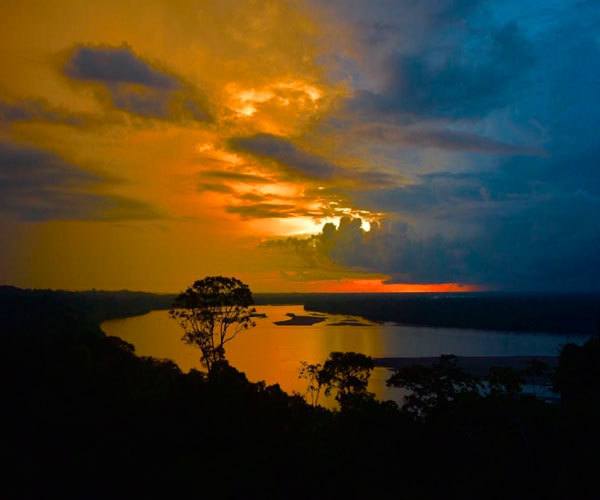 Along the Amazon rainforest, there are some very interesting options for contributing to communities that have chosen to stop monoculture expansion and destruction caused by petroleum extractions. These communities have developed responsible tourism as a way to keep their traditions and to safeguard the forest.
So why should you choose Ecuadorian communities and the Ecuadorian rainforest?
Biodiversity
Biodiversity is what the Amazon rainforest is all about. The sheer number of species is overwhelming. With over 2,000 different species of mammals and birds alone, the rainforest is a bonanza for any naturalist or anyone who just loves animals. That is without mentioning the botanical treasures. There is a lot of life yet to be discovered. Ecuador has protected areas like the Yasuní National Park, declared by the WWF (World Wildlife Fund) as one of the priority places to protect because of its biodiversity.
Along the Amazon rainforest, there are some very interesting options for contributing to communities that have chosen to stop monoculture expansion and destruction caused by petroleum extractions. These communities have developed responsible tourism as a way to keep their traditions and to safeguard the forest.
So why should you choose Ecuadorian communities and the Ecuadorian rainforest?
Biodiversity
Biodiversity is what the Amazon rainforest is all about. The sheer number of species is overwhelming. With over 2,000 different species of mammals and birds alone, the rainforest is a bonanza for any naturalist or anyone who just loves animals. That is without mentioning the botanical treasures. There is a lot of life yet to be discovered. Ecuador has protected areas like the Yasuní National Park, declared by the WWF (World Wildlife Fund) as one of the priority places to protect because of its biodiversity.
 Wildlife observation
The eco lodges, within the Ecuadorian wildlife reserves, are built with the purpose of close observation, without intruding upon the animals. It is a commitment between tourism and minimal disturbance of these wild creatures, in their own habitat. Of course, the ban on hunting or fishing of some communities helps to maintain and preserve the abundant wildlife.
The rainforest has four distinct ecosystems between the ground and the tall trees. Platform towers can provide easy access to higher, hard-to-see levels. Walking tours and river trips offer the same opportunities.
Wildlife observation
The eco lodges, within the Ecuadorian wildlife reserves, are built with the purpose of close observation, without intruding upon the animals. It is a commitment between tourism and minimal disturbance of these wild creatures, in their own habitat. Of course, the ban on hunting or fishing of some communities helps to maintain and preserve the abundant wildlife.
The rainforest has four distinct ecosystems between the ground and the tall trees. Platform towers can provide easy access to higher, hard-to-see levels. Walking tours and river trips offer the same opportunities.
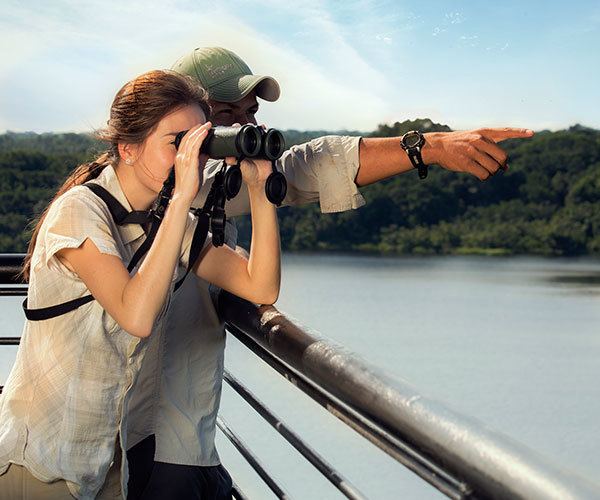 Local culture
Some Ecuadorian reserves are guarded and maintained by the indigenous population, who are the forest dwellers and descendants of the original inhabitants. An Amazon holiday will offer the opportunity to encounter a unique culture. Indigenous people will show you their customs, and their crafts and beliefs, which they are happy to share. Learn how they have lived within the forest, without harming or destroying it.
Local culture
Some Ecuadorian reserves are guarded and maintained by the indigenous population, who are the forest dwellers and descendants of the original inhabitants. An Amazon holiday will offer the opportunity to encounter a unique culture. Indigenous people will show you their customs, and their crafts and beliefs, which they are happy to share. Learn how they have lived within the forest, without harming or destroying it.
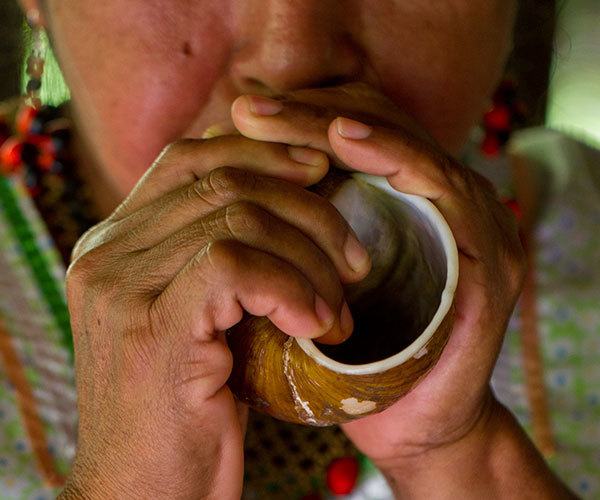 Comfort in the jungle
To attract the not-so-hardy and adventurous, eco lodges have been designed and built to provide a high standard of excellence. Imagine a five stars hotel in any capital city in the world, suddenly uprooted and transplanted in the middle of the jungle! Accommodation is blended, not opposed with the environment.
Local staff have been trained and now have the chance to work within their own communities. Some lodges include transportation and Wi-Fi.
Comfort in the jungle
To attract the not-so-hardy and adventurous, eco lodges have been designed and built to provide a high standard of excellence. Imagine a five stars hotel in any capital city in the world, suddenly uprooted and transplanted in the middle of the jungle! Accommodation is blended, not opposed with the environment.
Local staff have been trained and now have the chance to work within their own communities. Some lodges include transportation and Wi-Fi.
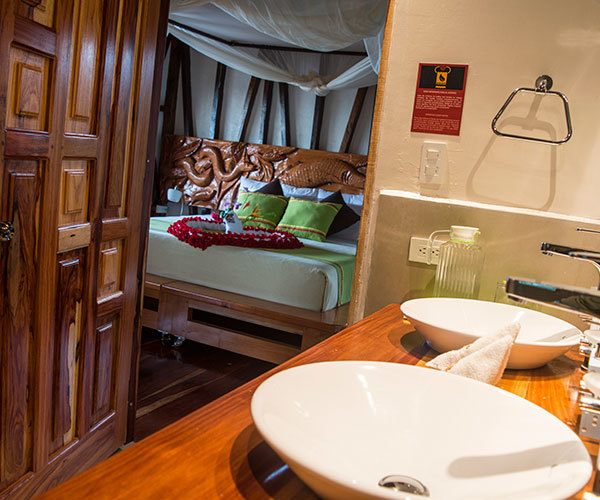 Conservation
By opting for an Ecuadorian Amazon vacation, you are contributing to conservation. The money you spend goes to maintain the reserves and support the people who have guardianship over the rainforest. The revenues gained from the lodges are reinvested in renewable energy and other community projects such as education and healthcare. Without revenue from eco-tourism, wildlife reserves are under threat from human expansion, commercial exploitation and fire. This tremendous effort has been awarded and recognized worldwide.
Conservation
By opting for an Ecuadorian Amazon vacation, you are contributing to conservation. The money you spend goes to maintain the reserves and support the people who have guardianship over the rainforest. The revenues gained from the lodges are reinvested in renewable energy and other community projects such as education and healthcare. Without revenue from eco-tourism, wildlife reserves are under threat from human expansion, commercial exploitation and fire. This tremendous effort has been awarded and recognized worldwide.
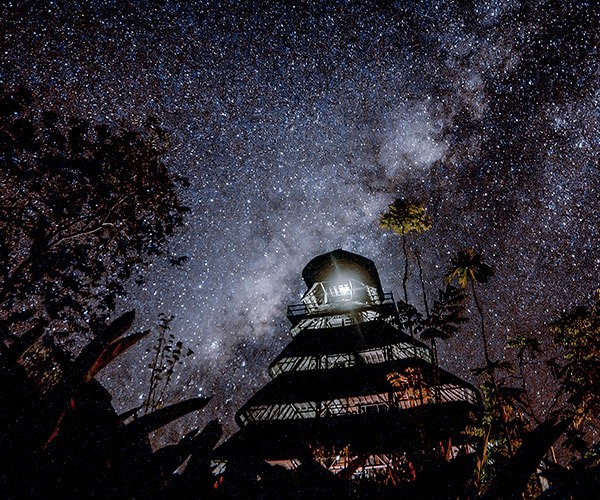 Miguel Andy is General Manager of Napo Wildlife Center. Napo Wildlife Center is an eco-lodge offering unforgettable experiences in the Amazon rainforest of Ecuador, inside Yasuni Biosphere Reserve, which is managed by the Añangu kichwa aboriginal community.
If you would like to be a guest blogger on A Luxury Travel Blog in order to raise your profile, please contact us.
Miguel Andy is General Manager of Napo Wildlife Center. Napo Wildlife Center is an eco-lodge offering unforgettable experiences in the Amazon rainforest of Ecuador, inside Yasuni Biosphere Reserve, which is managed by the Añangu kichwa aboriginal community.
If you would like to be a guest blogger on A Luxury Travel Blog in order to raise your profile, please contact us.Did you enjoy this article?
Receive similar content direct to your inbox.


Give me as much adventure as you like during the day though I definitely need my home comforts at the beginning and end of the day. I think I’m definitely it that category of people you describe as “ not so hardy”. I did a lot of sleeping on floors and fields with sleeping bags in my teens and twenties so I’ve moved on from that. Nowadays a first class, First World bathroom is a non-negotiable for me. I would love to travel to the Ecuadorian Amazon but it would have to be staying in complete comfort.
Hello Julia,
That´s true!, fortunately, there are nice first class options in the Ecuadorian Amazon, with 24/7 electricity.
Regards.
I just hope that all the news about the Amazonian fires prompts some action. It’s been appalling that a political spat developed halting aid being sent to Brazil. The point made here that there are probably more species to discover and classify is in a way very worrying. Some species might become extinct before they are even “discovered”. If that happens it would be truly tragic.
Hello Jean,
I´m completely with you. If you want to collaborate with Indigenous people living in the Amazon and trying to protect the forest, there are some interesting options, especially in Ecuador.
Regards.
“Learn how they have lived within the forest, without harming or destroying it.” That’s the key sentence for me in this fascinating and thought-provoking post.
Wherever I travel there are always lessons to be learned. I’ve got a horrible feeling that too many of us have grown up in a use it once and then dispose of it society. I know too many people who think nothing of buying a cheap T shirt, wearing it a couple of times and then throwing it away.
At the end of the day a lot of these “primitive” tribes actually have fair more sensitive and intelligent ways of living than many supposedly more “advanced “First World” peoples.
Hello Kev,
That’s actually right, with the Amazon people, you learn life is much more simple to what some persons are used to.
Regards.
Visiting the Ecuadorian rainforest is one of those bucket list dreams for me. It’s so opposite to the concrete jungles of the UK and such a different way of life, and the nature is breathtaking. It’s brilliant there are so many protected areas and that they use the revenue accrued from tourists to invest in community projects and renewable energy. Out of curiosity though, how high is the risk of dengue and malaria? I’m not sure that you can get vaccinations for the likes of dengue but I imagine there are precautions you can take to limit your exposure and chances of such problems like malaria.
Hello Julia,
Actually it is a very interesting fact that indigenous communities are opting for tourism instead of cutting trees, monoculture or even petroleum. Tourists feel their money is being well invested, collaborating with Comunity Projects. For the Ecuadorian Amazon, in the Yasuní, it hasn´t occured any case of malaria, yellow fever or zika virus in more than 20 years. You don´t even need to be vaccinated nowdays.
Regards.
I think the last paragraph about bringing in tourist reviews to fund eco-tourism is a very good one. It’s a real bonus if long after your holiday is over and the suntan’s faded that you can think that the money you spent on travel is still bringing benefits to the place that you visited. I always try to organise so that my travel is helping other people as well. Hopefully the stories that I tell will encourage other travellers to travel responsibly too.
Hello Beth,
It is actually a commitment from Indigenous Communities. Visiting their projects is a way to return that commitment and of being part of the solution.
Regards.